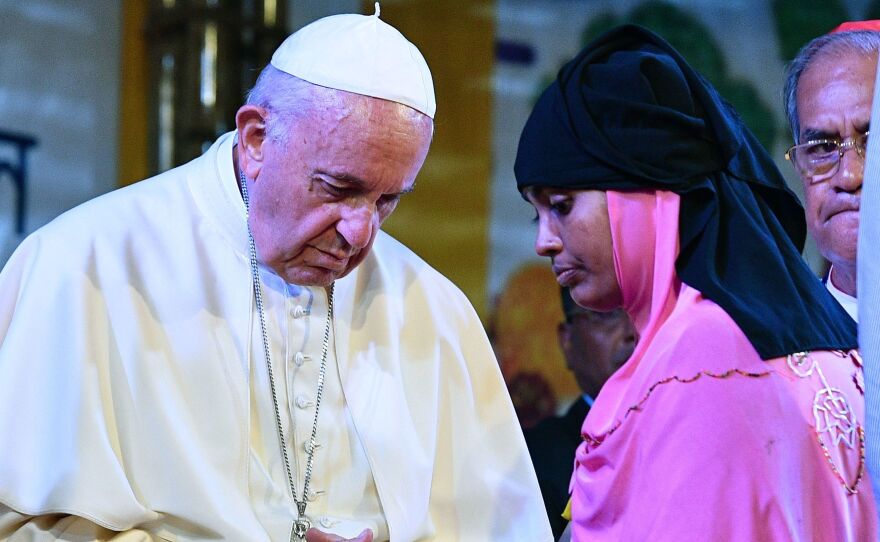Pope Francis met with a group of Rohingya refugees in Bangladesh on Friday, offering them blessings and hearing their stories — and specifically mentioning the Muslim minority by name, something he avoided doing during his visit to Myanmar, where Rohingya have faced persecution.
"The presence of God today is also called 'Rohingya,' " the pope said, at the end of an interfaith meeting that was held in the garden of the archbishop's residence in Dhaka, Bangladesh.
The refugees had traveled from the city of Cox's Bazar in Bangladesh, where more than 620,000 people have sought refuge amid a violent military crackdown against the Rohingya in Myanmar's Rakhine state that began in late summer. In speaking to them, the pope asked for their forgiveness on behalf of those who have wronged them and those who have ignored them.
"Pope Francis was visibly moved as he met the refugees who fled a military crackdown in Myanmar to neighboring Bangladesh," NPR's Sylvia Poggioli reports from Dhaka, Bangladesh, where she's been traveling with the pope.
"The pope grasped the hands of the 12 men, two women and two young girls and listened intently to their stories," Sylvia says. "The pope told them, 'Dear brothers and sisters, we are close to you. And on behalf of all those who have harmed you and of the indifference of the world,' the pope added, 'I ask forgiveness. Let us not close our hearts and look away.' "
Francis met with the refugees in Bangladesh days after he met with Myanmar President Htin Kyaw and nominal leader Aung San Suu Kyi, and spoke about the need to respect all ethnic identities and resolve conflicts through dialogue.
Leading up to that visit to Myanmar, the topic of how the pope would address the humanitarian crisis had been a subject of debate and speculation. Suu Kyi's government has been under fire for its treatment of the Rohingya Muslim population.
"Buddhist-majority Myanmar does not recognize the Rohingya as citizens," as the Two-Way reported earlier this week. Francis had been warned that mentioning the Rohingya by name while in Myanmar could lead to reprisals.
Myanmar and Bangladesh recently agreed on a deal to repatriate refugees who have fled across the border, but Myanmar says that the terms cover only those Rohingya who have official papers — a tall hurdle for people who aren't considered to be citizens.
Copyright 2017 NPR. To see more, visit http://www.npr.org/.






